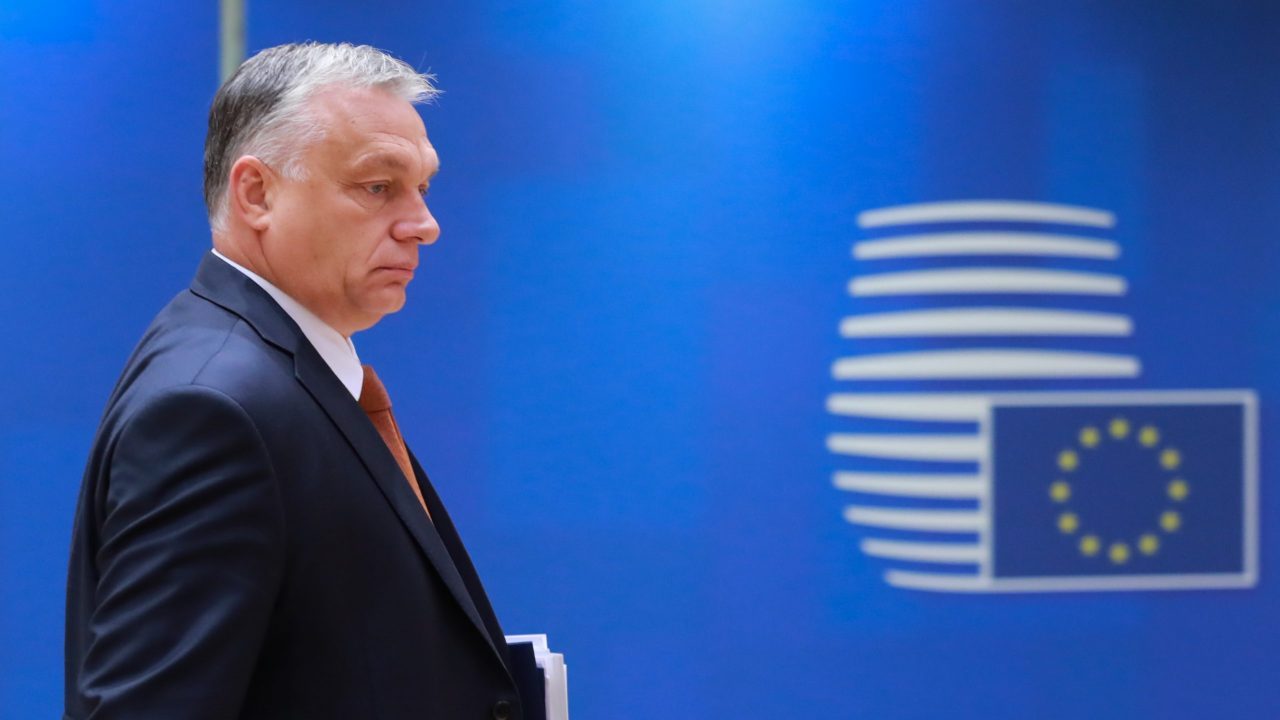Europe’s first consequential election of the year is fast approaching. On April 3, Hungarian voters will elect a new parliament, which may end the 12-year reign of Viktor Orbán and his far-right Fidesz party.
While much political focus will be saved for the dramas of the French presidential election a week later, this Hungarian vote really does matter. Not just for the European Union (EU) and its troubled relationship with the proudly illiberal Orbán, but also for the future of democratic accountability and the rule of law in the EU.
Hungary’s government has worked hard to ensure it is not removed by the electors, even when the opposition was hopelessly fractured and not much of a threat. Now that opposition parties have united around a single leadership candidate, the gloves are off.
Orbán is relatively popular: the government’s social policies, which include measures from the conventional, low-interest family credits, to the unconventional — a zero tax band for mothers with four or more children — and most recently, a cap on the price of basic foodstuffs, enjoy fairly wide approval, and his nationalist posturing strikes a chord with many Hungarians whose history education is focused on the perils of existence as a small nation at the crossroads of empires. Pollsters routinely estimate Fidesz’s support between 33-40% of voters.
But Fidesz’s parliamentary supermajorities depend not only on these policies, but also on a mixed and gerrymandered electoral system that turns pluralities of votes into legislative supermajorities. These are then used for near-total capture of the state, shielding those in power from the scrutiny of independent institutions and an honest electoral campaign. To have a hope of winning, opposition parties that range from cosmopolitan liberals to the far-right, must unite, and even then, they are exposed to spoiler parties, which popped up across the country in 2014.
Yet, the united opposition coalition may, for the first time, have a real chance to win power: the united list is neck and neck with Orbán’s Fidesz party in latest polls and thanks to a pre-selection of opposition candidates in groundbreaking primaries, the opposition stands a realistic chance in single-mandate, first-past-the-post districts as well, where a plurality of votes is enough to win.
Provided that the election is fair and free, that is. And chances are that it will not be.
Last week 20 Hungarian civil associations, including the Hungarian Helsinki Committee, Transparency International and Amnesty International Hungary, formally asked the Organization of Security and Cooperation in Europe (OSCE) and its Office for Democratic Institutions and Human Rights (ODIHR) to send a full-scale observation mission to Hungary before the election, complete with long-term and large numbers of short-term observers, instead of the “limited” mission that the organization usually deploys to EU members.
OSCE observers listed numerous problems in Orbán’s last two victories, with the 2018 vote judged just about tolerable. “Fundamental rights and freedoms were respected overall, but exercised in an adverse climate,” the report said. In particular, observers noted “intimidating and xenophobic rhetoric, media bias and opaque campaign financing,” among other things, a public broadcaster that “clearly favored” the government, and “a pervasive overlap between state and ruling party resources, undermining contestants’ ability to compete on an equal basis.” Freedom House downgraded Hungary to “partly free” following this last election.
Things have gotten significantly worse since: Orbán’s allies now control a large majority of the offline media market, as well as a public broadcaster now firmly under its control. Relentless taxpayer-funded publicity campaigns praise the government and deride the opposition. A recent law and a referendum, to be held together with the parliamentary vote, conflates LGBTQ rights with pedophilia, in the mold of Russia’s hostile 2013 law. In 2021, a journalistic investigation showed that several journalists, public personalities, and at least one opposition politician were spied on with the powerful Pegasus spyware, following its purchase by the government.
Corruption, including in the prime minister’s closest circles, is rampant. For years, Hungary has held the dubious distinction of topping the list of the misuse of EU funds, compiled by the bloc’s anti-fraud office. The Prosecutor’s Office, led by an Orbán ally, cherry-picks the cases it wants to address.
In spite of the playing field heavily tilted in his favor (see above), Orbán seems to be preparing to contextualize or circumvent a potential defeat at the ballot boxes. His government has accused the US of “meddling.” These claims usually build on the fact that the opposition’s candidate for prime minister, Peter Marki-Zay, a conservative small-town mayor, once lived in the US and that Orbán’s government spent large sums of money to make the Jewish Hungarian-American financier George Soros into a hate figure.
Furthermore, last year the Fidesz-dominated parliament passed a law establishing “public foundations” separated from the government, which will take over $1.7bn of assets from the state. Fidesz-appointed officials will run vital institutions such as hospitals and universities, which critics see as a transparent attempt to establish a parallel state in case Orbán loses. The legislature is also set to elect a new head to the country’s Fidesz-dominated media watchdog, who will be in power until 2030.
The reasons why the EU and the US must ensure that the election is free and democratic are perfectly clear:
- An unfree and unfair election would not only contradict the democratic values of the US, the EU and Transatlantic cooperation; it would allow a significant security risk to grow further. First, Hungary’s illiberal turn has gone hand in hand with Orbán cozying up to autocracies from Belarus and Azerbaijan to China and Russia. His government has sabotaged united EU statements on a wide range of issues, from Hong Kong to the Middle East; it struck murky deals with Russia and China; several sources — from Bellingcat to a former high-ranking Hungarian officer — have stated that Russia uses Budapest as a launching pad for intelligence operations in Europe.
- Second, the European public space is much more connected today than even 10-15 years ago. Orbán’s assault on democratic institutions has a growing group of admirers in Europe who are inspired by his successes and the lack of resistance that he has encountered. Illiberal leaders contemptuous of Transatlantic institutions and international legal norms — from France’s Le Pen to Italy’s Salvini — cite Orbán as favorable example to their voters. In the highly volatile Western Balkans, Orbán has supported nationalists who engage in brinksmanship.
- Lastly, it is a vital interest of not only Hungary and the EU, but also of the US, that the April election, including the campaign and its aftermath, is truly democratic. While EU institutions should use their toolbox to act against grand corruption and institutional capture more actively, this will realistically not make a difference before the election. However, OSCE member states, including the United States, should throw their full support behind a full observation mission — as did 62 members of the European Parliament from a wide variety of parties. In addition, Hungary’s allies should raise the prospect of appropriate sanctions should observers find that the election fails to meet democratic standards.
Orbán’s media asserts that Hungary is targeted by hostile, anti-conservative forces inside and outside the country, which are engaged in a grand conspiracy to bring the country down. In reality, as Orbán knows, Hungary only occasionally flickers as a concern for EU and NATO allies, despite its flouting of democratic norms. It’s time the issue was taken more seriously.
András Tóth-Czifra is a Non-Resident Fellow at the Center for European Policy Analysis. He is a political analyst from Hungary, based in New York City, and is also a Senior Analyst at Flashpoint Intelligence.
Europe’s Edge is CEPA’s online journal covering critical topics on the foreign policy docket across Europe and North America. All opinions are those of the author and do not necessarily represent the position or views of the institutions they represent or the Center for European Policy Analysis.





